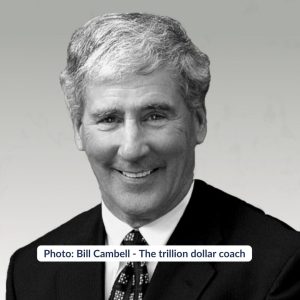
Alan Eagle
Guest is known for...
Bill Campbell was an American businessman, who worked as a VP of Marketing and Board Director for Apple Inc and CEO for Claris, Intuit and Go Corporation. He became a renowned coach, working with prominent business leaders including Steve Jobs, Jeff Bezos, and Larry Page. His insights have been compiled in the book Trillion Dollar Coach, written by Eric Schmidt, Jonathan Rosenberg, and Alan Eagle, who interviewed more than 80 leaders who knew and worked with Campbell.
Here's what I will learn...
Alan Eagle, co-author of “Trillion Dollar Coach,” discussed Bill Campbell’s transition from sports coach to business coach and executive. The conversation then focused on the differences between being an effective team coach and an executive coach for individuals.
LISTEN TO THE FULL CONVERSATION
From the Podcast
Alan speaks about Bill Campbell’s journey and the various transitions he has been through – from being a Football Coach to becoming a Business Executive to Leadership Coaching where he worked with several luminaries such as Steve Jobs, Founders of Google, Eric Schmidt, Sheryl Sandberg, Al Gore. He also speaks about how Bill transitioned from one canvas to another and what stayed the same across these stints.
Alan speaks about some of the things that Bill Campbell did to earn the trust of the leaders he worked with. This is all the more incredible as he worked simultaneously with leaders who were involved in an intense competition in the market-place. He also speaks about the fact that Bill had made his money and did this as a service. He alludes to Bill’s radical candour which is encapsulated in the phrase “I don’t take cash, I don’t take stock and I don’t take s**t”.
Alan speaks about a ‘Product’ that Bill might have accidentally invented in the way he went about doing his work – The notion of a ‘Team Coach’. He speaks about how Bill would spend time getting to know the individuals and the overall team to be in a position to be of value to the collective.
Alan speaks about how Bill and leaders at Google deal with super-star performers who can have enormous impact given their talent can be leveraged and multiplied with technology. He specifically speaks about what to watch out for as determine if we should put up with the complexity or the toxicity that’s caused by the employee.
Bill Campbell was known to have a “salty language” filled with expletives. Alan provides nuance around how Bill used his directness to land tough messages. He also goes on to talk about the safety net that Bill would create around the difficult conversation so that the leader does not get overwhelmed with the feedback.
Alan speaks about how Bill got his Coachees to believe in themselves and how he often he had greater faith in them than they had in themselves. Alan goes onto talk about how Bill would play the role of a cheerleader in public settings to give a boost of confidence to the people he worked with.
Alan discusses some of the failures of Bill Campbell as an Executive and his perspectives around Bill being open to input from his Coachees. He speaks about the style of Bill’s intervention where he would not give specific suggestions but share stories and let you come up with your own conclusions.
Alan speaks about how Bill would go about engaging with leaders and ensuring that they made good decisions. There is a piece here around following the right process for making a good decision. He also speaks about his role in helping leaders move on once a decision is made (whether it is in your favour or not).
Alan speaks about what mattered to Bill and how he measured his impact or success. He speaks about Bill’s genuine love for people, his keen desire to help them succeed and his passion for building communities around him.
Alan speaks about Bill’s role during some of his key transitions in his stellar career at Google. He speaks about the fact that despite his clarity of thought on the business front, when it came to making decisions for himself, there was an element of irrationality. Alan goes on to speak about Bill’s role in ensuring that Eric made sound choices at those crucial moments.
